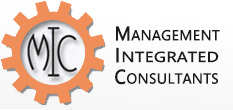Overview

Management Integrated Consultants – MIC has been providing organizations with independent and professional Assessment and Audit services* since its inception and prior under the different capacities of the founders since 1973, to national, regional, international or specific contractual specifications and standards. These audits and assessments were either 1st party (internal), 2nd party (supplier, customer), or 3rd party for independent reporting or certification purposes or other intents, where an independent opinion for decision making is being thought.
* Note: Use of “Assessments” in-lieu of “Audits” is somewhat more comprehensive and best practice judgment based.
An important strategic management tool for sustainability
Assessments, and the ensuing gap analysis of the organization’s management system, processes, or products, are an important strategic management tool for sustainability and continual improvement through corrective and preventive actions.
A powerful management tool for improvement
MIC’s SWOT-based assessment identifies major processes and activities, strong and weak points within the existing management system, any specific requirements or prerequisites, and/or any external threats and opportunities. The maturity of the business environment and staff performance are also evaluated and improvement plans are recommended to management.
“Company Assessments are an important part of ensuring that a company will not only survive but thrive.”
The data collected from the assessments is used along with integrated field training and implementation for helping build internal capacity for continual improvement and risk management.
Assessments are at the level of entities, systems, processes or products. They are an integrated part of the core strategic elements of MIC’s services, as such they can be triggered when needed or as required by management or through a scheduled program or through the development and implementation, or at any phase of the consulting job.
Scope, Purpose, and Objectives
Assessments and Audits are defined by their Scope, Purpose,and Objectives.
 The Scope defines the extent of the coverage; may be a system, a process or procedure, or a product; may be a function, an activity , a section, a department, a division, or any well defined entity, or the organization as a whole. The scope of the assessment is to include the documentation system, field operations, administration, and logistics, and any support operations.
The Scope defines the extent of the coverage; may be a system, a process or procedure, or a product; may be a function, an activity , a section, a department, a division, or any well defined entity, or the organization as a whole. The scope of the assessment is to include the documentation system, field operations, administration, and logistics, and any support operations.
The purpose of the assessment defines what is to be achieved; being usually either for “compliance” which involves both controls and compliance for conformance to a set of rules, criteria, specifications, standards, written manuals, procedures, work instructions etc., or, for the “suitability & effectiveness/efficiency” of such controls in achieving management objectives, termed as “management assessments”.
The objectives of the assessments sets the “outcome” to achieve one or more of the following:
